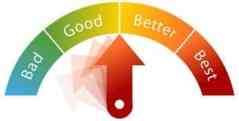
Prepare for Your Post-Mortem
You feel you’ve done all that you could to plan for your introduction or interview:
- Key messages nailed down. Check.
- Practiced and culminated your delivery. Check.
- Wore the correct clothes and powdered your face to eliminate shine. Check.
But did you get ready for an assessment of your performance? Nobody is perfect. We all have good and bad days. Your goal is to keep improving and refining your performance. What’s more, every interview and presentation is a performance.
You can start the assessment during the meeting. Request feedback from the audience. You can ask, “Before I move on to my next point, does anybody have a question?” or “Did that clarify the process sufficiently?” If you see heads nodding up and down, you’ve done your job. Be grateful if someone does ask you to repeat your instructions. Undoubtedly others in the audience didn’t exactly get them either and you have the opportunity to recover and clarify your thoughts.
When talking with a reporter, check for understanding all through the interview. Ask, “Did that answer your question?” or, “Do you need any more information?” The journalist will be more likely to trust the information provided if you’re not hesitant to answer to his questions. Simply be certain you’re prepared with the information he needs or be able to get to it quickly.

Don’t be hesitant to call and ask why you weren’t quoted, but don’t be nasty about it. Ask if it was something you said – or didn’t state – that got you left out of the story. Attempt to learn in the event that it was your fault or because the story was edited and beyond his control.
The Post-Mortem
To better assess your performance:
- Ask for feedback. Request it verbally and, in case you’re presenting to a large audience, ask participants to complete an evaluation form before they leave. While you may get some accommodating remarks, many in the audience don’t bother to fill them out and the ones who do will consistently discover something negative to state. Nonetheless, you actually may get some helpful information.
- Ask a counsel to screen your performance. Ask somebody from your PR office or organization to participate in your introduction or media interview. Then debrief with him afterwards.
- Record your television presentation. In case you’re showing up on television, set your DVR and audit your performance later. Screen the video more than once. Did you hit all your key messages? Did you visually connect? Did you use gestures suitably? Did you deal with the Q&A so you had a lively discussion with lots of good questions?
- Tape Your Media Interview. When doing an interview by telephone, record the interview to play back later. On the off chance that you are in a sit-down meeting, request the reporter’s permission to tape the interview. Critique yourself thereafter similarly as you did with video.
The propensity after an interview or presentation is to zero in on all the things that turned out badly. Start first by zeroing in on what you did right. If you are well prepared, then your post-performance assessment will undoubtedly reveal just minor things that can be improved. Try not to be excessively hard on yourself and expect flawlessness each time you’re on stage.
